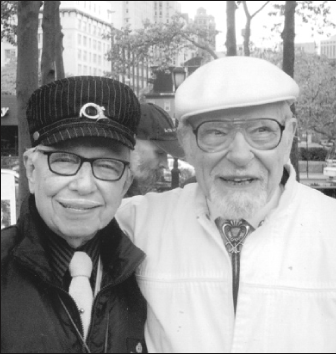By Paul Schindler
A dire weekend weather forecast that revived memories of last year when heavy downpours drenched roughly 1,000 participants made the 2007 Wedding March this past Saturday the smallest in the event’s four-year history.
No more than 200 turned out May 19 for the annual grassroots organized by Marriage Equality New York, which this year began with a rally in Foley Square that was followed by a brisk, at times wet trudge over the Brooklyn Bridge to Cadman Plaza near Borough Hall.
Those who turned out were fortified not only by small umbrellas arrayed in the six colors of the rainbow, by which marcher organized themselves, but more importantly by the encouraging words from the two legislators carrying Governor Eliot Spitzer’s marriage equality bill in Albany — Assemblymember Daniel O’Donnell and Senator Tom Duane, both gay Manhattan Democrats.
O’Donnell, who represents the Upper West Side, told the crowd that in the weeks since he assumed sponsorship of the bill the governor announced at the end of April, he had identified 52 colleagues willing to sign on as co-sponsors and another 20 or so who are prepared to vote aye when the measure comes to the floor. In the 150-member chamber, 76 votes are needed for passage. (On Wednesday, an O’Donnell spokesperson said the total number of sponsors had risen this week to 55, with as many as 78 expressing willingness to support the bill in a floor vote.)
In the immediate wake of Spitzer’s introduction of the bill, O’Donnell said that the biggest misconception he must overcome among his colleagues is the fear that marriage equality would compel communities of faith to perform wedding ceremonies against their will. He closed his relatively brief remarks in Foley Square Saturday by quoting Thomas Jefferson, with an observation that examined the church-state separation issue from precisely the opposite perspective: “Our civil liberties have no dependence on religious opinion.”
Across the East River, in Cadman Plaza, O’Donnell’s Downtown Senate counterpart, Duane, didn’t wade into the numbers game, instead choosing the part of cheerleader.
“I believe in the marriage vernacular,” he told a crowd that had dissipated after 45 minutes of a chilly, damp trek. “It’s raining. We’re having good luck and we’re having good luck in the Legislature… We’re going to have marriage in New York State very, very, very, very, very soon.”
It’s probably not a coincidence that it was O’Donnell and not Duane who was engaged in handicapping his colleagues’ likely intentions. With the Senate in Republican hands, even by the slimmest of margins, no vote on marriage equality is in the offing there, at least for this session. In contrast, there is a very good chance that the Assembly could vote before the June 21 recess, and O’Donnell’s job between now and then is to convince his Democratic colleagues, who number a lopsided 108 out of 150 total, that he has built a sufficiently cushy majority to put his party’s caucus behind it by bringing it to the floor.
For some grassroots activists on hand Saturday action cannot come fast enough.
Gustavo Archilla was heading home from voice lessons at Carnegie Hall when he met his lover Elmer Lokkins in Columbus Circle. The year was 1945, and Archilla, a native of Puerto Rico by then living in New York, worked in what was at that time a thriving shipping industry here. Lokkins, raised in Sunnyside, Washington, had just come out of the service, where he had spent time in the Philippines, New Guinea, and Australia, and was in New York hoping to gain late admission to Columbia University. He was listening to a man giving a speech in Columbus Circle when he was approached by someone whom he immediately came to think of as his “beautiful Spanish don.”
The couple has been together for the more than six decades since — Archilla is 91 and Lokkins turned 88 on Sunday — and today live in their home of the past half-century in Morningside Gardens near Columbia. For most of that life together, legal marriage was probably not conceivable, and in its place they enjoyed a full life, the support and love of family and friends, and most importantly, each other.
“After 62 years, it’s wonderful to have a partner who gives you a kiss every time he walks by you,” Archilla said with evident emotion about Lokkins on Saturday.
Still, the world keeps changing and in 2003 Canada brought something new into their life. They married across the bridge in Niagara Falls that year.
Speaking to the audience in Cadman Plaza on Saturday, Archilla said, “Canada made it possible for us. I hope everywhere else it will soon be possible. Maybe while we are still alive, though there is not much time left.”


































